(continued from 30 September 2010)
Testing in the morgue
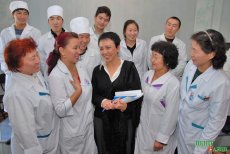 Larisa Shoigu meeting with colleagues in Medical College, Kyzyl. November, 7 2007- Larisa Kuzhugetovna, why did you choose the profession of a physician? Larisa Shoigu meeting with colleagues in Medical College, Kyzyl. November, 7 2007- Larisa Kuzhugetovna, why did you choose the profession of a physician?
- I am ashamed to admit it, but it was a spontaneous decision. My friends and classmates, Nina Kravtsova and Tanya Filippova were planning to go to medical school, but I vacillated between journalistics or mathematics, I was interested in the Novosibirsk mathematics school. As far as journalistics were concerned, Papa had a serious talk with me, telling me what I remembered for the rest of my life: as a journalist, you either have to be very good, or you’ll spend the rest of your life correcting proofs. Mathematics somehow spontaneously sloughed off.
So I followed my friends into medicine. And I never regretted it.
But we did not just dive in without thinking. We decided to test ourselves beforehand – can we or can’t we? And we tested ourselves in the morgue.
My friend’s relative worked in the anatomic pathology morgue. He allowed us to watch an autopsy. It was an autopsy of a woman who died of cancer. And the three of us stood there until the very end. Then we came out of there and said – OK, let’s go to medical school.
So the three of us went and finished medical school; true, each of us in a different city. Nina in Barnaul, Tanya in Krasnoyarsk, and I went to Tomsk.
When I entered the Tomsk institute in 1970, there were 9 or 10 people competing for a single spot.
In the madhouse
- And your specialty?
- I am a psychiatrist. At school, I found psychiatry very interesting. My husband was very enthusiastic about it, and he brought me into the department and to a psychiatry club. And I liked it very much.
When I returned home, I went to the ministry of health to ask for an assignment; when I said where I wanted to work, the minister, Nikolai Vasilyevich Sizykh grabbed his head and said: when you come begging to get out of there, don’t come to me. He thought that I was making a bad decision.
At that time it was thought that a psychiatric hospital was a very undesirable branch of medicine. It seems to me that even Papa and Mama were a bit discouraged by this choice. What do you mean, to work in a madhouse?
And what is it like, to work in a madhouse?
I really loved my work. Seriously. I felt easy with the patients. In my opinion, a psychiatric patient is a special person. If you feel and understand, and accept him as an equal, you have proved yourself as a physician.
I worked in the Tuvan republican psychiatric hospital from 1976 to 1998; from a resident to the deputy of the chief treating physician.
Do you know that after I left the psychiatric hospital, I kept dreaming about the patients for several years?
And strait-jackets, injections, which are given until the patients are completely stupefied, the terrible orderlies?
Those are just rumors. Mostly inventions.
Even though the life of a psychiatrist is not simple. In the other specialties of medicine, the patients are usually grateful. But in psychiatry it is rare, only perhaps in some kind of neurosis.
Here you do not see positive results as often as in other branches of medicine. There are many more chronic patients.
But I refused to continue to an aspiranture I wanted to keep working with the patients, to be a clinical specialist.
So that I how I worked in Tuva for 21 years. I was even a forensic psychiatrist, the chairwoman of the forensic psychiatry commission. Even a Merited physician of Russia, with a certificate signed by Yeltsin.
And I was involved in Chinese medicine. I studied for 3 months from morning to night with the Chinese, who used to come to Kyzyl.
When we moved to Moscow, there was a vacant spot at the MChS polyclinic. I was not placed ahead of someone, I started in reflexotherapy, then I became the deputy of the chief physician of the polyclinic.
And how many years have you been working in medicine?
All my adult life, since 1970, if you count the first year in medical school. Not including the past 3 years since I have been a delegate to the Duma, in the health care committee.
Her only husband
- Was it your brother’s idea for you to change your career from medicine to politics?
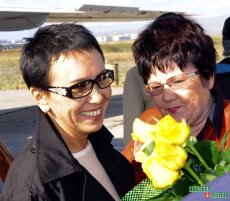 Larisa Shoygu with her fail-safe assistant Marina Firsova at Kyzyl Airport.- Yes, it was. Volodin came to me and asked – there is such an idea, what do you think about it? Larisa Shoygu with her fail-safe assistant Marina Firsova at Kyzyl Airport.- Yes, it was. Volodin came to me and asked – there is such an idea, what do you think about it?
I thought for a while. And then I answered: I can’t decide this on the spot, I have to go to Tuva and talk with people. I went there, to come to a conclusion whether I should agree to it or not. When I figured out that this is what really matters to me, that it is my whole life – people do not leave me indifferent, I agreed to it. And I did not change my mind.
That is my character. It is not a totally good character, because people tell me that I am not quite normal.
- If this is an abnormality – the ability to make unexpected decisions – then I am in favor of abnormality. Huge numbers of people are not able to make an independent decision that would radically change their lives. Did it not drastically change your life, when you said – yes?
- Could not be more drastic. My family members forgot that I can cook. My husband started cooking.
We live on instant food, which he thinks he cooks very well.
That is the same husband who lured you so cunningly into a psychiatry club and decided your medical specialization? He is the only one?
One. The only one. Konstantin Yakubovich Flamenbaum.
I married him a hundred years ago, when I was still a student, we graduated from the same school.
His father is from Poland. His grandmother and sister died in Warsaw during the war, during the Warsaw uprising.
He is a surgeon. Many people in Tuva remember Konstantin Yakubovich. Whenever I come back, they often come up and tell me that he saved their life, and send their regards.
We had some very difficult times in life. He survived a very serious heart surgery. He used to work at a hospital in Moscow, and now he works at a polyclinic. He had to switch, because he could not stand at the surgical table anymore.
- I am sure your son must be very handsome, as all children with such mixed blood.
- They say he is handsome. Sasha is a lawyer, he is 35 now. There are two grandchildren – Nikita, who is eleven, and Masha, she will be three on September 25.
- When you took back your maiden name for political reasons, when you were to become a delegate – was it a shock for your husband?
 Solangy Oorzhak - graduate of choreography school in Kyzyl and Alantos ensemble (headed by Raisa Stal-ool), now - student of Bolshoi Theatre Academy of Choreography.- It was not easy, but he understood everything. Neither he nor our son saw it as a betrayal. Solangy Oorzhak - graduate of choreography school in Kyzyl and Alantos ensemble (headed by Raisa Stal-ool), now - student of Bolshoi Theatre Academy of Choreography.- It was not easy, but he understood everything. Neither he nor our son saw it as a betrayal.
But according to rumors, I have already divorced my husband several times, and all kinds of other things.
So now I officially declare: I have one husband – the only one.
As one of my friends laughs at me: you are not contemporary, you married only once.
About friends. Who is your best female friend or friends?
Now I have two friends in Moscow. One of them is not connected in any way with either politics or with medicine. But we are close in spirit, and we can talk together about everything. My other friend is also a delegate.
But the friends of my childhood remain friends for life, regardless of the fact that I don’t see them as often as when we were young. The closeness at heart stays intact, you can share a lot.
Such friends from childhood are my classmates Nina Kravtsova and Tanya Filippova. And Natasha Kutsenko, we lived in the same house and the families were friends. Her Papa also used to go to Moscow, and our Papas used to bring the same dresses for us. So before we went outside we would call each other to make absolutely certain that we did not come out dressed alike.
How one can lose weight very nicely
- Was the pre-election campaign in November 2007, when you were elected as Tuvan delegate for the State Duma of Russia as part of the federal candidate ballot for “United Russia” difficult?
- Oh, very! That is a good way to lose a lot of weight. But that is something that you and me do not have to worry about.
But I am very pleased by the meetings with people. I have learned a lot from the people, they were sincere, and I saw a real, live interest. The questions they asked me were not ordinary. It was insanely difficult, but I did what had to be done.
- When you came to the Duma, were you disappointed or disillusioned with it?
- In some ways – yes, in others – no. There was no total disillusionment – oh, what a nightmare.
It is interesting here! It widens the horizon; one learns a lot of new things. And on top of that, you get this colossal possibility of helping someone.
- And do you manage to help – to say it openly?
- Honestly – yes. I think that if you get to be a delegate, then you can’t just sit in the meetings. If you help people in some way, play a positive role in their further life, then it was not in vain that you went for a delegate and survived the crazy pre-election campaign.
The most important part of this work, it seems to me is to decrease the amount of dirty politicized problems. I don’t ask those who write to me for help: and did you vote for me, and whom do you support, after all, LDPR or “United Russia”? They all write to me. Some, it is true, say that they voted for me, but some don’t.
Because I have this last name, people from the whole Russia write to me, not just from Tuva. Some delegates, if they receive a letter from another region, forward it to the delegate of that region, but it is not a rule for me and my helpers. We respond and try to do something about the case, if there is a possibility. If we can help, we help.
I have a very good team, I am very grateful to my aides. I have great aides both in Moscow and in Tuva. They are all verified, they are people who find the work interesting, because people who work as aides for the delegates are paid very little.
- And how many of these state aides do you have?
- In Moscow, one and half, because one of them also works with one of my colleagues, a delegate from Stavropol region; our offices are next to each other.
In Kyzyl, I have two aides. Chymba Salchak and Marina Mikhailovna Firsova, extremely experienced person with amazing energy, she even used to work with Papa, and reminisces about him all the time.
And don’t back down
- What was the most significant thing that you have done in the three years that you have been a delegate, what are you proud of?
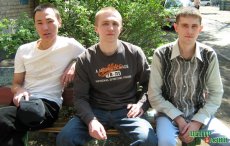 Students Vadim Samchad-ool, Aleksandr Ermolayev and Aleksey Zhuk freed after not-guilty verdict. Kyzyl, May 19 2008.- In terms of simple help for people? Do you remember those three students that were kept in jail in Kyzyl for almost two years on false accusation of homicide? Students Vadim Samchad-ool, Aleksandr Ermolayev and Aleksey Zhuk freed after not-guilty verdict. Kyzyl, May 19 2008.- In terms of simple help for people? Do you remember those three students that were kept in jail in Kyzyl for almost two years on false accusation of homicide?
- Of course. That was a well-known “case of the students” – Alexander Yermolayev, Vadim Samchal-ool, and Alexei Zhuk, it was a triumph of “justice, impartiality and professionalism” of local Themis. I think that their mothers performed a citizens’ action in the name of their children, they went on a hunger strike, and incited the public, they asked for help whoever they could think of to prove that the charges were false, and the sentence of 9 years and one month of strict regime was not just.
So you were involved in that case, too?
- Of course. Their parents contacted us by letters, and we got involved in the case. The fact that they were released and rehabilitated was our doing.
When they were released, we took care of their reinstatement at their schools. When they were released, even though they were imprisoned unjustly, suddenly they were not students anymore, and they were to be drafted into the army.
That was, surely, one of our significant actions.
I am also very pleased that we successfully brought to attention our talented children. For the first time in the history of Tuva, a girl got into the Bolshoi Theatre Academy of Choreography.
Raisa Sedipovna Stal-ool, the director of the Kyzyl choreographic school, and the leader of the “Alantos ensemble contacted me: “I have such a talented girl here – Solangy Oorzhak, she needs help.”
So when the ensemble came to Moscow, she called me – we are here. It was winter, and, of course, there were no entrance exams. I asked the dean of the Academy of choreography to take a look at the girl, to see if it made sense for her to come in the summer. They took a look at the girl and said – of course, she has to come. And they accepted her. She has been studying there already he third year. She is one of the best, excellent. We watch how she studies.
It is also very good that we managed to get supplementary funding for the renovation and reconstruction of the Theatre of Music and Drama.
One of the serious cases is that I managed to publish Sevyan Vainshtein’s book “Tainstvennaya Tuva” (“Mysterious Tuva”). We bought the rights to publish the book the book was published with my prologue, a very good edition, and I distributed it for free.
Apparently the majority of requests to you as a physician, a member of the health care committee, concerns people in need of health care?
Those whom we helped to get medical care are countless. But I will never forget the eyes of one of them. There was an 18-year old boy who had a humpback. He sat at home, never went anywhere. His relatives contacted me, because they could not get surgical correction for him.
We got it, and they operated on him. And when I was in Kyzyl, he and his relatives came to see me bringing flowers. And he had such eyes! He tells me that he rides a motorcycle, and that girls have started calling him. You can’t top that! Do you understand?
For some reason I remember very strongly one case. It had nothing to do with Tuva or its residents, but I remember it. Probably because it took a lot of effort. A leader of a public reception called me and pleaded: we do not have a receiving day today, but, please, receive this man. All right.
And such an interesting little grandfather showed up – from the Ukraine – and said: “put me into a hospital in Moscow.”
Why not in the Ukraine? And he: “I don’t want to go there, they treat us badly.”
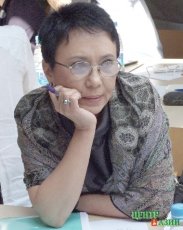 The whole problem was in the fact that he was a Ukrainian citizen. Already a foreigner. And we have a treaty only with Belorussia, and we can hospitalize only Belorussian veterans of the Great Patriotic War for free. And for him, you would have to pay on the full commercial scale. I explain to him: “you are not a citizen of Russia, it is not possible.” And he: “Daughter, I am a citizen of the Soviet Union, I fought for it, and I don’t care about the rest.” And those words really touched me. But what was to be done, how could we help him? And we managed to get him into a Moscow hospital after all! We did it. The whole problem was in the fact that he was a Ukrainian citizen. Already a foreigner. And we have a treaty only with Belorussia, and we can hospitalize only Belorussian veterans of the Great Patriotic War for free. And for him, you would have to pay on the full commercial scale. I explain to him: “you are not a citizen of Russia, it is not possible.” And he: “Daughter, I am a citizen of the Soviet Union, I fought for it, and I don’t care about the rest.” And those words really touched me. But what was to be done, how could we help him? And we managed to get him into a Moscow hospital after all! We did it.
When I told my colleagues – delegates about it, they could not believe it.
It turned out that everything can be solved. All you need is effort – and don’t back down.
Autism wrong side out
- Do they often ask you to do the impossible?
- Yes.
- What undone things are you ashamed of?
- You know, there is a concept in psychiatry – autism wrong side out. That is when somebody starts and tells everything that is in his heart or even behind it to everybody he can. Tells absolutely everything about everything. Those things that I did not manage to get done, are painful. Not shameful, but painful. There is nothing to be ashamed of, because I tried to do them, but I was not successful. If I did not try, if I had deceived somebody, that would be something else. But I have never deceived anybody in my whole life. But I won’t talk about this pain, because I do not have autism wrong side out.
- All right, without autism wrong side out, but let us talk about things that were not finished. For example – the rebuilding of the Ustuu-Khuree temple in your native place – at Chadan.
The cultural foundation “Por-Bazhyn”, which you established with your brother, and where you are the head of the revision commission, started the project, which, for years, did not move forward. A copy of the temple was built next to the ruins of the destroyed one. But it did not get finished.
And today, there is a strange situation on the grounds of the temple; on the outside, it is there, even though not quite finished, but at the same time, it is not there. I specially went there this summer and got very upset about the old walls of Ustuu-Khuree – what a mix of abandonment and decrepitude with cigarette butts and show ad posters left by visitors.
And the Kamby-Lama of Tuva says that the lamas will start to hold services and be responsible for the temple complex when the building is finished, and when they get the key from it.
So who is supposed to finish it and give them the key?
- Yes, that is a big question. We started the building of the temple to get it started and to encourage people to action – those who live there. If you ask how much we spent on Ustuu-Khuree, you can’t even imagine it.
- I was not going to ask about the financial aspect of it, but since you brought it up, I will ask: how many thousand rubles did the foundation “Por-Bazhyn” spend on the rebuilding of the Ustuu-Khuree temple?
- About 60 million rubles. Can you imagine that? But it is impossible to attract sponsors all the time. Impossible. I always said that building of such cultural monuments is a national project. And all the temples, everywhere and always, have been built for money collected from the nation.
Could be that it may get to the people’s consciousness?
And the problem with the new Russian Orthodox temple in Kyzyl is that the question about it is now strongly politicized.
- Yes, it was politicized from the very beginning. Do you know the history of the temple? This is how it was: before the 2002 elections, when president of Tuva, Sherig-ool Dizizhikovich Oorzhak, was being elected as the chairman of the government of Tuva, the building of the Orthodox temple was specially started. Sherig-ool Dizizhikovich, demonstrating his tolerance and open-mindedness to the voters, personally put down the foundation stone, together with Senator Pugachev. They also promised that by October of 2003 the church would be finished.
Well these were ordinary pre-election promises, playing games with the voters. There was no spiritual sense in all of that, and I speak as a Russian Orthodox person Kyzyl did not need a new Orthodox church. We do not have enough believers to fill even a fourth of the new huge temple on the biggest church holy days. And the maintenance – electricity, heating? The Kyzyl community is not rich, and can’t afford the communal payments.
So now there is a beautiful shiny dome towering over Kyzyl an unfinished temple of politics, and not spirituality. For the believers, the old Holy Trinity Church is enough; it changed completely after the energetic Father Vyacheslav was assigned here and took things in hand.
- Many people say that the temple is huge. But I have this problem: the old sponsors have stopped financing long ago, but when the construction is once started, it has to be finished.
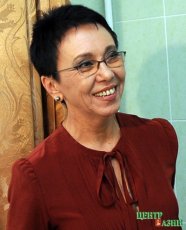 With my brother, we practically found the sponsors. But we can’t send anybody there to start the work, when it is now so strongly politicized. With my brother, we practically found the sponsors. But we can’t send anybody there to start the work, when it is now so strongly politicized.
And I know father Vyacheslav. I met him on the eve of the elections. Sholban Valerievich went to the Buddhist temple, and I went to the orthodox. Father Vyacheslav welcomes me and says: “What brought you here?”
I answered: “The elections are tomorrow, so I want to pray.”
“Yes, I heard something about it.”
And he left. See, your politics don’t concern me. He is so independent.
So I lit a candle, and prayed.
And on my next visit I brought two icons, which we kept in the family. With my brother, we decided to donate them to the church.
And now we keep in contact with Father Vyacheslav. He knows me well, and writes if there are some problems.
I have contact with the lamas as well, we support their school.
My mistakes
- What are you reading now?
- I am reading several books at the same time, depending on mood. I read Bradbury with pleasure, Ovchinnikov, and I adore Chekhov.
- Which of the great women of history is your ideal?
- It is complicated. If you mean by character, then there is no woman that is completely satisfactory. If you could mix bits and pieces from several of them in one bottle, something ideal might come out. A bit of Margaret Thatcher, a bit of Indira Gandhi, a bit of Mother Theresa.
Somehow I never thought whom I would like to imitate. Probably nobody.
My life is my life. And my mistakes are my mistakes, and I am responsible for them.
- You can be responsible for yourself, without looking for somebody to blame for your mistakes?
- Of course. Who else would be responsible for me? I am responsible for everything that happened and is happening in my life, and nobody else.
- Not many people are like that. Most people prefer to look for somebody to blame for their lack of success, and usually find somebody to put on their guilt for their life fiasco.
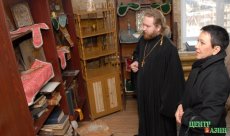 Priest Vyacheslav showing Larisa Shoygu ecclesiastical books and icons of Saint Trinity Church of Kyzyl, March 27, 2008- Yes, I know some like that. But I am responsible for everything that happened and is happening in my life. I do not believe people who say: if I could live my life again, I would not change anything. There are some things which I would avoid, because now I am wiser. Priest Vyacheslav showing Larisa Shoygu ecclesiastical books and icons of Saint Trinity Church of Kyzyl, March 27, 2008- Yes, I know some like that. But I am responsible for everything that happened and is happening in my life. I do not believe people who say: if I could live my life again, I would not change anything. There are some things which I would avoid, because now I am wiser.
I remember when Papa said one, when he was not working anymore: you know, it is such a terrible feeling when you know what to do, but can’t. I understood much later what he meant.
Our Papa is a philosopher, he led us through life. He led us inconspicuously.
- What is the rule of your life?
- Never try to put everything under one rule. I try to live in such a way as to be in agreement with my inner “I”.
If I do something that is not quite right, God forbid, it is very difficult afterwards. I never found it objectionable or shameful to apologize to somebody, if I did not act correctly.
- Do you know how to apologize?
- Of course. I can apologize to my son, or even to grandchildren if I was wrong. That again shows vulnerability and limitedness, when people can’t get over their self-love and admit a mistake. Well, this is what I am like at root.
Men had to call
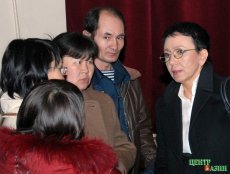 Meeting with electorate. Kyzyl, 2008- Do you drive? Meeting with electorate. Kyzyl, 2008- Do you drive?
- No. even back when I worked as a physician at the psychiatric hospital, our chief physician Viktor Vasilyevich Podkorytov used to tell me: “You have to drive a car!” and our drivers used to teach me out of town, in the steppe.
But then I was in an accident with Viktor Vasilyevich, and later in three accidents with our drivers. And I developed some sort of instinctive fear – I can’t make myself to sit behind the wheel. I can’t do anything with that.
My son deliberately does not let me get a license. But my husband says: you are just pretending to be afraid. Sometimes I think – could he be right?
- And do you travel in Moscow in a Duma car?
- Yes. Here the women delegates have their personal cars and two permanent drivers who take shifts. The men do not have this, only chairmen and vice-chairmen of committees. The other men have to call for a car.
- As I found out, now it may be faster in Moscow to take the metro than go by personal car, because of the endless traffic jams. When was the last time you took the metro?
- Listen, it was not so long ago. Las winter. I needed to go somewhere, I do not remember the reason, but I took the metro. Honestly – I went by metro.
- Your favorite color?
- Black and white.
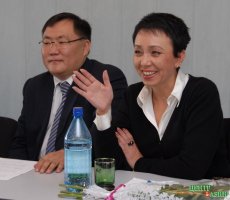 White blouse and black jacket - favorite classic combination of colors. Meeting with electorate together with the Head of the Government Sholban Kara-ool. November, 2007.- Pants or skirt? White blouse and black jacket - favorite classic combination of colors. Meeting with electorate together with the Head of the Government Sholban Kara-ool. November, 2007.- Pants or skirt?
- Pants.
- Gold or silver?
- What I have now – silver. But generally gold. But I am not stuck – if I see good costume jewelry, I will wear it. I never collected precious things. I wear what I like at a given moment.
- And men - dark hair or blondes?
- Dark hair, of course. It seems to me that they have more pronounced personalities.
- Ideal man?
- An ideal man – that is very complicated. We all dream about some ideal, which really does not exist or is found only very rarely.
Of course, one can dream, why not dream. Take any romance book, and wow! There he is! But in life, there are no ideals like that.
- Where do you prefer to dress?
- I can’t say that I am attached to any concrete store or clothing of a certain brand. I can dress classically, or like a hooligan.
- Like a hooligan? How?
- That is any way Mama does not like. Even my husband is sometimes shocked. Some (balakhony) or something punky.
Until the next aquarium
- Do you have pets?
- We do not have a pet. Our son has a cat, but we do not.
Since the start of our family life, things have not really worked out with pets for us. They need care and responsibility, but we always worked, were on duty, and had to travel on business.
True, we tried to keep fish several times; that is the only thing we could try. But when we would go away, we would give the fish to my parents to watch them, and then we would forget to take them back. And Papa had to take care of them, cleaning the aquarium and would keep asking: “When are you going to take them back?” In the end they would give the fish to somebody, until we got another aquarium.
- Do you have a favorite movie?
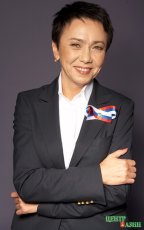 - I can’t say concretely that this one is my favorite. But there are some films that affect you so strongly that you can see them only once. Then you try not to go back to them. - I can’t say concretely that this one is my favorite. But there are some films that affect you so strongly that you can see them only once. Then you try not to go back to them.
But there are other films which help your soul to relax. Those you can watch many times with pleasure, for example “Only old men go to fight”, or the old American film “The Magnificent Seven”, with Yul Brynner.
I love good old soviet comedies.
- Your trim figure – is it sport, fitness, strict diet or heredity?
- It is thanks to Mama and Papa, that I have genes like that. I never did any sports, I never go to fitness clubs, and I don’t entertain myself with diets.
Our physical education teacher Nina Konstantinovna Kuzmina used to say at school: “Brother and sister – heaven and earth.” My brother is an athlete. I am not.
My girlfriend recently gave us an exercise machine, a conveyor belt for running. My husband and I were born five years and two days apart. So she gave us this joint present. He called me, completely horrified: make her take it back! But I was very happy; the first time I walked and ran on it, but then I put it away – there is not enough time.
But I like the idea that potentially I could. If I wanted to.
- How about a face lift – not on principle?
- Not because of a principle. Many have it done. But so far I have not seen it as necessary.
Abnormal euphoria
- Politics or personal life – which would you choose if you had to?
- Of course, personal life, those who are always next to me – my nearest ones.
- Are big politics really so dirty or is it tolerable?
- I can’t say that big politics are only filth. It is not all painted in the same color; it is a mosaic just like life itself. The main thing is – you should do your job. As again my Papa used to say, and my brother says now – do what has to be done, and let the rest take care of itself.
- What is your favorite floor in the Duma?
- What floor? The fourth, mine, where I work.
- Favorite food?
- Meats and sweets.
- Drink?
- Coffee. I do not drink alcohol. I think that euphoria from alcohol intoxication is abnormal. If you feel good, you will feel good without it, too.
I hardly drink at all. Only when it is absolutely necessary and I can’t refuse, I can pretend to be drinking – sip some cognac. Cognac, because I get migraines from any other alcoholic beverages.
- Do you smoke?
- Rarely. Now less, before - a lot. Practically all doctors smoke, it is a sort of specific defect.
I do not smoke in front of my mother. She does not like it, and we do not want to traumatize her. She would be worried and sick if she saw it.
- How many rooms in your apartment?
- Three.
- Any dacha, vacation house?
- No.
- Family car?
- “Ford – Focus”. Kind of silvery, not very strong.
- What is the most valuable object you own?
- Some material valuable object? I do not have anything like that, nothing that I could point to and say: this is extremely valuable. No, nothing special like that.
- Maybe you collect something?
- I can’t say that I have a big collection. But I love and collect dolls, but not the kind you can get in any store, only special ones, made in a non-ordinary way.
It is better at home
- How is working with Tuvan government, do you have contact?
- I have a good working relationship with Sholban Valerievich Kara-ool and his cabinet of ministers. I have met all the ministers and we are in touch. They have all been to my office at the Duma. We have worked on many problems together, for example about the program of construction of housing for young families in villages.
We are always coordinating our plans as to common goals and tasks – those are normal work contacts. But our work is set up in such a way that when I am in Tuva, I don’t burden them with my presence. They have to do their work, and I have to do mine.
- When you are in Kyzyl, do you stay at a hotel or on the Red Partisan Street - in the three-room family apartment on second floor?
- At first I used to stay at a hotel, but lately I stay at home. It is better at home.
We had the old windows changed for new plastic ones, and now it is quiet, peaceful and warm. All the window frames were crooked; it is one of the first stone buildings in Kyzyl.
- In the almost three years since you have become a delegate, how many times have you been to Tuva?
- How many times? I can’t even count that fast. Many times. Even my colleagues at the Duma say: you travel to your region so often.
- Do you travel by special plane?
- No. by ordinary airplane. Just like everybody else.
And when you go around the districts, do you use a helicopter?
I travel to the districts by car; I have never been in a helicopter in my life. I don’t have that kind of money – to hire a helicopter. And I could never do it for government money. I got used to paying for everything myself.
I have been to practically all the districts. I have not been only to Ovyur and to Khovu-Aksy. I will definitely have to go there.
The major psychoses
- What is your favorite theme or subject in psychiatry?
- Endogenous psychoses. That means all the major psychoses – schizophrenia, manic-depressive psychosis and epilepsy. Not minor, but major psychiatry.
- Does it ever seem to you that lately humanity has been especially prone to major mass psychosis?
- No. The proportion of major psychoses has remained constant over centuries. An obvious example: Hitler, when he was in power in Germany tried to kill off, and practically did kill, all people with psychiatric disorders. After twenty years, the percentage re-established itself. It is what it was, and you can’t get away from it.
- And what is the percentage of people with psychiatric disorders?
- Three-point-six percent.
- In your professional opinion, is the percentage the same, 3.6%, in the Duma, or is it significantly higher than the world norm?
- I hope that we are not outside the norm!
- What is your personal way of fighting stress?
- When I get very tired, I have to be alone, I a quiet place. So that nobody bothers me.
- Are you strong?
- They say that I am. But it seems to me that I am ordinary.
- It is a lot more advantageous not to be strong; the strong ones have to do everything: you are strong, you will handle it!
- It is so. At one moment I thought: “I wish I was born a little blonde in all respects!”
But if you are serious – many people think that sometimes I act against logic, against reason. But I believe that one has to use the heart and soul as well as reason.
- But does the heart not present an obstacle at the Duma?
- Yes, it does, very much. It does, because these are not games, just some meetings over tea. Serious things are done here. And I feel my part of the responsibility.
There are problems to be solved. And they have to be solved in such a way that you would not be ashamed in front of yourself. To be responsible to yourself is the hardest part.
People around you forget a lot. But your conscience does not forget. And you can’t deceive yourself.
|
